Films about arranged marriage are pretty commonplace in India and the Middle East. But this Franco-Turkish story seeks to alert Western arthouse audiences to the issue by arousing liberal ire rather than exploring the socio-cultural issues in any great depth. Deniz Gamze Ergüven's directorial debut may have been nominated for the Oscar for Best Foreign Film and won four Césars, but its inevitable descent into melodrama undoubtedly compromises its message.
It may be an Oscar nominee but its descent into melodrama undoubtedly compromises its message.
Scripting with Alice Winocour (who explored the notion of trophy wives in Disorder), Ergüven begins by showing how much Günes Nezihe Sensoy and siblings Ilayda Akdogan, Tugba Sunguroglu, Elit Iscan, Doga Zeynep Doguslu enjoy life in their Black Sea backwater. But, from the moment they are caught frolicking on the beach with some local lads, their purity becomes more important than their innocence and they are placed on the marriage market by their reactionary grandmother and lascivious uncle.
The sexually active Akdogan keeps seeing her secret boyfriend, while Sensoy manages to slip away from the endless lessons in pliant domesticity to join the all-female crowd at a football match. But, while granny Nihal Koldas is bent on finding husbands, she turns a blind eye to the abusive antics of son Ayberk Pekcan, whose lust brings about a tragedy that still shocks despite its cynical calculation and gauche echoing of Sofia Coppola's The Virgin Suicides.
The insights into Islamic issues with female sexuality are shrewd and sincere, while the performances of the largely non-professional cast are excellent. But Ergüven’s direction lacks nuance, with too much reliance being placed upon the voiceover narration, while the heavy handed symbolism often labours otherwise cogent points and the denouement is more sentimental than optimistic.

